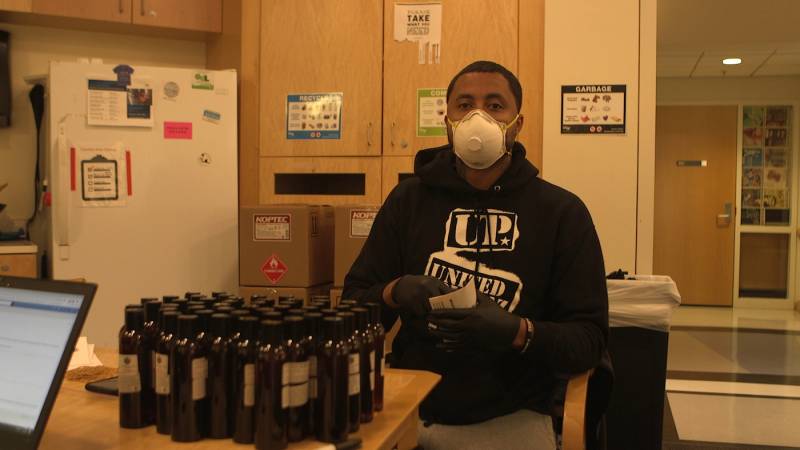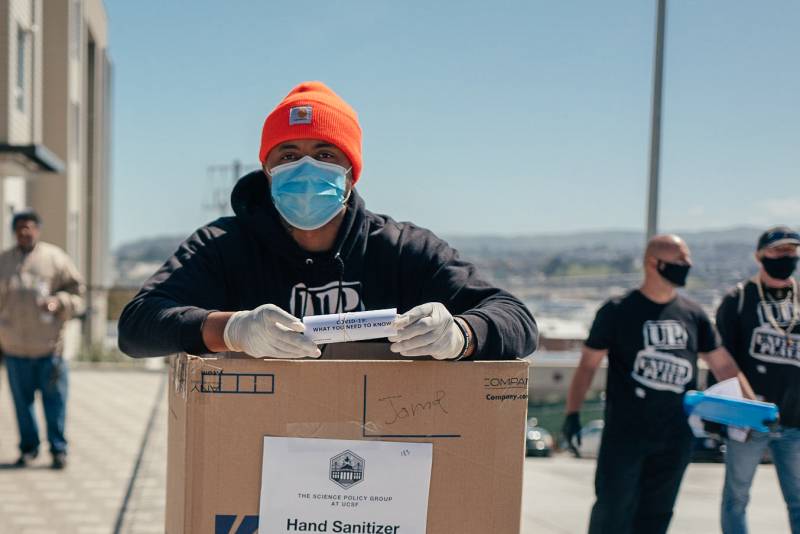For the past three months, San Francisco’s Jamal Trulove has been working with UCSF’s Science Policy Group in order to get masks, hand sanitizer and information to groups that have been most impacted by COVID-19.
You might’ve heard a little bit about Trulove’s story.
He’s an actor, who played the role of Kofi in the 2019 film, The Last Black Man in San Francisco. He’s a rapper, under the stage name 10MilliMilli, he’s dropped a handful of songs, and is working on more.
And last year he was awarded a multi-million dollar settlement in a case with the SFPD, after being framed and falsely imprisoned for a 2007 murder; a case that led to him serving over six years behind bars. Since then, he’s been vocal about that case and the prison system.
This week on Rightnowish, we talk to Trulove about what politicized him as a teen, to what it means to leverage relationships and star-power in order to serve his community– in San Francisco and behind bars– in the midst of a pandemic.
Below are lightly edited excerpts of my conversation with Jamal Trulove.
Jamal: I think it’s important to play a grass root position in all of this. Coming from project housing in San Francisco to be able to be that person on the front line to help out with our communities, such as mine and beyond. They say every hood is the same, you know, just in a different location.
Pen: When you’re out there on the streets or when you’re out even in the prisons, how are people responding to you?
Jamal: Well, they’re not actually letting us in. You know, they’re swinging us around the side and just like dropping off the bottles and getting it to ‘em. Obviously, we would have loved to go inside. But I mean, look, I lived in those prisons, man. And it ain’t no good. It’s a health hazard all the way through, especially in San Quentin, especially in old Folsom. And it’s like, least they could do was accept this hand sanitizer. We appreciate that they even accepted it because there’s some jails and prisons who haven’t accepted it. We’re hoping that they change their mind. But I do get phone calls, you know, from cats, that’s in San Quentin and also in Folsom. Like, “Right on, bruh. Good luck, you really doing it. You know, you’re doing it for us, you understand, like,” I’ve been getting a lot of big, phone calls and thank you’s and stuff like that from people on the inside.

Pen: What you’re doing right now, both in terms of the activism and the art, it’s almost like you’re in the role of a model.
Jamal: Yea, but like, you know, like the great Tupac said, “I don’t want to be a role model, because a role model plays a role. I want to be a real model.”
Jamal: I remember being in those projects you know, not really caring about my life. You know, having nihilism in my blood where I don’t care if I die or if I had to shoot somebody, you know. I had no option. And I had no resources. And, you know, the projects and the hood, It’s a scary place, man. A scary place. So I want to be able to use my platform and my image to show the kids in the youth that’s coming up in these communities. Even people my age, you can change. Now, you too can rise above.
Pen: At what point in your life did you become interested in politics or even community activism?
Jamal: I’ve been into politics ever since the World Trade Center got hit.
Pen: Yeah?
Jamal: I’ve been in politics, watching the news, and just being aware. I was actually in juvenile hall when it happened. And they had us locked down where they were gonna leave, as they said, if something happened in San Francisco, they would just dart out. And that’s when I start paying attention to the news. A whole lot. And then I started learning about who this president was, all of these different things. I’m like, whoa! Like, I thought this person was really cool, but then turned to find out that this person ain’t cool. And then it just ended up being something that I’ve just found a lot of interest in.
Pen: Yeah, and then from there, you said it’s just been growing. huh?
Jamal: Yeah. It’s just it’s just been growing from there. And then watching the whole war play out under George Bush, it’s just understanding, you know, Hurricane Katrina and all of these different significant things that was happening where ultimately I feel like, a lot of our communities there wasn’t enough attention being shown. And that’s why I’m focused on the underserved communities here in San Francisco.
Pen: Knowing you got that mindset, that philosophy and approach to interacting with people, what’s your game plan for the long haul? Do you see yourself involved in politics even further?
Jamal: I mean, I don’t know. Ain’t no telling what the future brings.

Rightnowish is an arts and culture podcast produced at KQED. Listen to it wherever you get your podcasts or click the play button at the top of this page and subscribe to the show on NPR One, Spotify, Apple Podcasts, TuneIn, Stitcher or wherever you get your podcasts.


